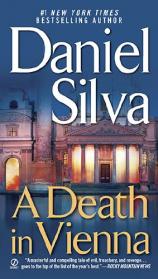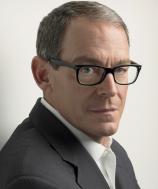Author Talk: February 2004
February 2004
In this interview Daniel Silva talks about his decision to write a series of books based on the Holocaust, the surprising information he learned while doing research for A DEATH IN VIENNA and the unforgettable experience he had visiting Treblinka.
Q: A DEATH IN VIENNA is the third book in what you've described as "an accidental trilogy dealing with the unfinished business of the Holocaust." Nazi art looting and the collaboration of Swiss banks served as the backdrop for THE ENGLISH ASSASSIN. The role of the Catholic Church in the Holocaust and the silence of Pope Pius XII inspired THE CONFESSOR. In the new book, your hero, the Israeli agent Gabriel Allon, pursues a Nazi war criminal living in the heart of Vienna under an assumed identity. What attracted you to the subject matter?
DS: I've always been haunted by the notion that men who committed some of the worst atrocities in human history were never brought to justice for their deeds. While I was researching the book, I read Olga Lengyel's mémoire of survival at Auschwitz entitled FIVE CHIMNEYS. She wrote: "Certainly everyone whose hands were directly or indirectly stained with our blood must pay for his or her crimes. Less than that would be an outrage against the millions of innocent dead." To me her words were made even more moving by the fact her wish did not come true. I think that, subconsciously, I wanted to punish the guilty, even if it was only in a fictional sense, and Gabriel was my tool.
Q: The story plays out in cities across Europe and the Middle East, each with a distinct sense of place. How did you choose these locations for your novel and what helps you capture each one's culture?
DS: I suppose that the story chooses the settings rather than the author. Gabriel lives and works in Venice because, besides being an Israeli agent, he's an art restorer who specializes in Italian Old Masters. Vienna was really the natural backdrop for a story about a fugitive Nazi war criminal because Austria, in many respects, is in denial over its past, and I wanted to explore that in the novel. Austrians made up a disproportionate share of the Nazi SS and the forces that carried out the extermination of the Jews, yet relatively few ever faced justice for their crimes. At the same time, there's a new wave of anti-Semitism in Austria, and the extreme right is once again knocking on the door of political power. As for the research, I travel, I watch, I talk to people, but mainly, I listen.
Q: In doing research for the book, what was the biggest surprise?
DS: The book was really inspired by some of the research I did for my last book, THE CONFESSOR. Perhaps I was somewhat naïve, but I never really understood how deeply the Church was involved with helping fugitive Nazis escape justice. I'd always assumed that something like ODESSA, the organization of former SS officers, was the culprit, but the efforts of ODESSA and the other postwar Nazi organizations were insignificant compared with those of the Vatican. Adolf Eichmann, Franz Stangl, and hundreds of other war criminals were helped by the Vatican. Michael Phayer, who wrote what many people regard as a very balanced study of the Church and the Holocaust, said that "by allowing the Vatican to become engaged in providing refuge for Holocaust perpetrators, Pius XII committed the greatest impropriety of his pontificate." I was also surprised at how quickly the victorious powers lost interest in bringing the murderers to justice after the war. The Cold War changed everyone's priorities.
Q: Are there still war criminals to be captured?
DS: Certainly. Obviously, most of them are extremely elderly, but Italy recently saw fit to indict three former SS men for the massacre of 560 people in a village in Tuscany. Ephraim Zuroff, the primary Nazi-hunter for the Simon Wiesenthal Center, estimates that we have five years before all the war criminals are dead. The Center has launched a program called Operation Last Chance, which offers financial rewards for information on suspected war criminals. And where has the program received the most hostile reception? Austria.
Q: You allude to the Secret Archives of the Vatican and the politically explosive material hidden in them. Do these archives really exist?
DS: They do indeed. In fact, they're called the Vatican Secret Archives, and presumably they contain a great deal of information about the conduct of the Holy See during and after the Second World War. The Vatican has allowed scholars to see some of this material, but most of it remains securely under lock and key. Anyone who's read THE CONFESSOR can probably surmise that I believe the material should be made public.
Q: You devote a chapter to the recorded testimony of a character who survived years in Auschwitz and the Death March from Birkenau. What provided the foundation for the devastating details? Did you read actual testimonies?
DS: I read a tremendous amount of material, not only survivor testimonies but histories of the Holocaust and the extermination camps. It was wrenching, and when I sat down to create a fictitious testimony, I found it to be one of the most difficult things I've ever attempted. It left me physically and emotionally exhausted, and for months afterward I suffered terrible nightmares.
Q: You refer to a German secret operation called Aktion 1005, a plan to conceal the evidence of the Holocaust. Did such a program truly exist?
DS: Yes, and it's one of the least-examined facets of the Holocaust. Without dwelling on the gruesome details, a special SS unit was created to organize and carry out the excavation and destruction of millions of Jewish corpses --- from the killing pits of Russia and the Baltic states to the extermination camps of Poland. The unit was very successful, and unfortunately we're dealing with its terrible legacy today. The pseudo-scholars and anti-Semites who try to argue that the Holocaust never happened --- or say that it has been greatly exaggerated --- like to point out that the remains of six million Jews cannot be produced. That is because so many bodies were destroyed by Aktion 1005.
Q: The climax of the story takes place in modern-day Treblinka. Did you visit the camp?
DS: I did, and it was a day I will never forget. It was a bitterly cold afternoon last October, and when I entered the camp, I was completely alone. I'd studied the operations of Treblinka before I arrived, but I still found it almost impossible to imagine that more than eight hundred thousand people had been murdered there. The Polish government memorial is an effective and moving tribute to the dead. It's not an easy place to get to, but if you care about this issue, as I do, then I recommend trying to see it.
Q: A DEATH IN VIENNA comes across as something of a cautionary tale. Did you form an opinion about the CIA's use of war criminals? Is there a message contained in the novel that reflects upon the times in which we find ourselves now?
DS: Decent nations, when they are frightened, sometimes take actions that don't look so flattering with the passage of time. Most of the men who worked for the CIA in the years immediately after its birth say they have few regrets about utilizing the talents of war criminals who served Hitler's Germany. I suspect there are a great many, though, who wish we hadn't employed such men. I'm sure we'll face many similar questions as the war on terrorism drags on. I only hope that fifty years on, when the archives are thrown open to the light of day, our children and grandchildren be proud of what they find there.
Q: This is your seventh book in seven years, and all of them have been New York Times bestsellers. Did you ever think you'd write so many books?
DS: Not really. I wrote the first one just for fun and would have been pleased just to have been a part-time writer. I was working in television news at the time my first book was published. I tried to do both for awhile, but something had to give. I chose writing. Secretly it is always what I wanted to do.
Q: A reviewer once wrote that he loved your work because you "strike that sweet spot of balance between reality and fantasy." Does it come naturally or do you have to aim?
DS: I like to search for a factual underpinning for all my stories, but once that foundation is in place, I feel free to go wherever my imagination wants to take me. A DEATH IN VIENNA, like THE CONFESSOR, is rooted squarely in fact, but it is also a work of entertainment. I like to think that I write serious novels in the thriller mode, and that's why they appeal to a wide range of readers.
Q: A number of reviewers have suggested that you've joined the ranks of Graham Greene and John LeCarré. Do you feel pressure being in such esteemed company?
DS: I feel flattered by the comparisons. I regard them as two of the most important novelists of the twentieth century. Period. In all honesty though, I think I have a long way to go before I would feel comfortable with comparisons to such literary giants.
Q: Your central character seems like a natural for the big screen. Are we likely to see Gabriel Allon in a screenplay in the future?
DS: One of the Allon books, THE ENGLISH ASSASSIN, has been sold as a film and is currently in development. We've traveled a long road together, Gabriel and I. I must say that it would be very strange to see him on the big screen --- but very exciting too.




